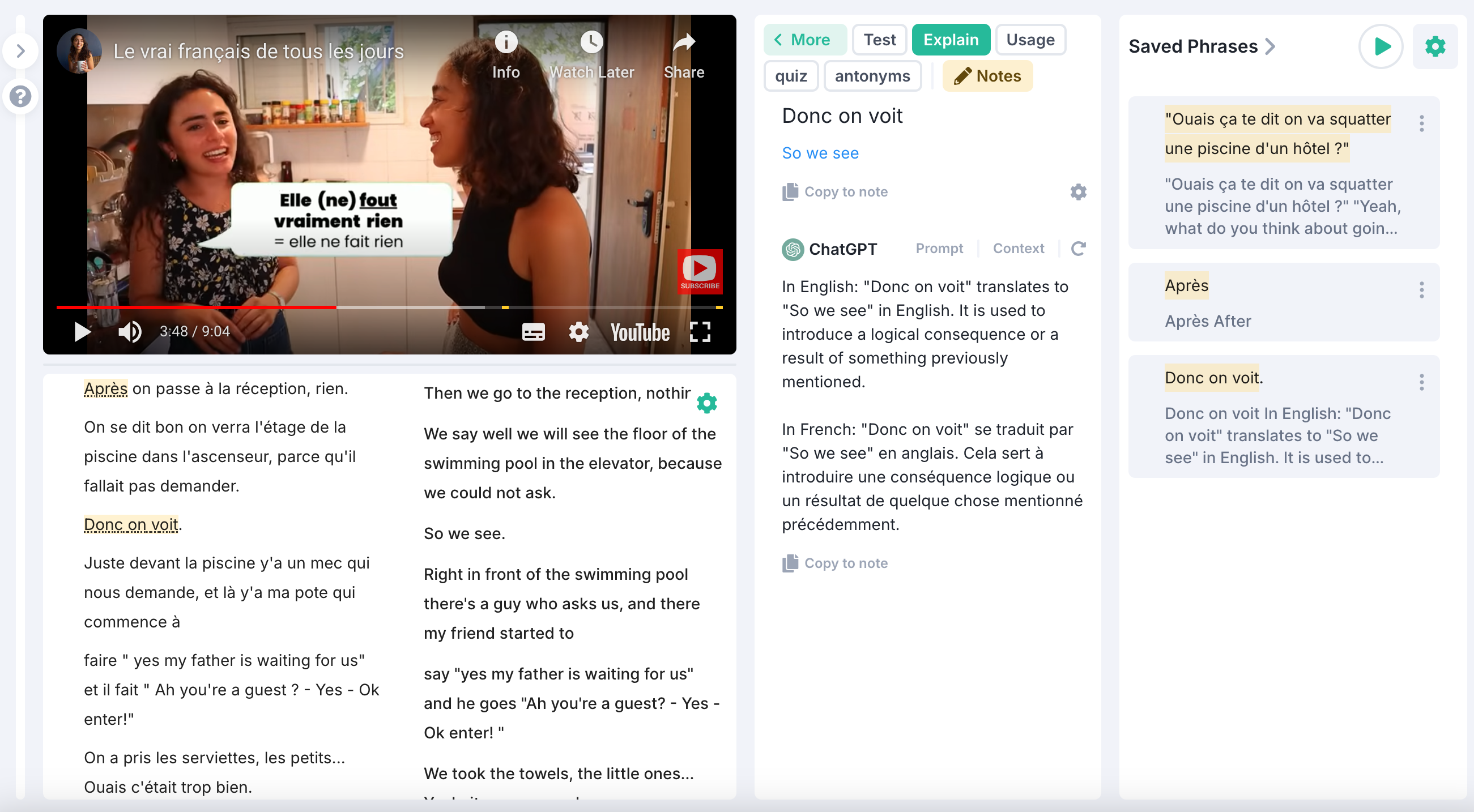Can You Have a Language Learning Routine?
Read other articles:
Back to posts
Table of Contents
- 1 Why a Language Learning Routine Matters (But Isn’t the Only Way)
- 2 The Power of Consistency Over Rigidity in a Language Learning Routine
- 3 Building Consistency Without a Fixed Language Learning Routine
- 4 The Science of Habit Formation in a Language Learning Routine
- 5 Using Technology to Build a Flexible Language Learning Routine
- 6 The Flexibility of Routine-Free Language Learning
- 7 Staying Motivated Without a Traditional Language Learning Routine
- 8 Final Thoughts: Crafting Your Own Language Learning Routine

For many language learners, creating a routine feels like the key to progress. A consistent schedule promises structure, predictability, and a steady path to fluency. But life doesn’t always accommodate a rigid plan. For those juggling work, family, or unpredictable schedules, the question arises: Do you really need a strict language learning routine to succeed? Or can flexibility be just as effective?
The answer lies in understanding how habits form, leveraging the science of language acquisition, and embracing strategies that align with your lifestyle. In this blog, we’ll explore research-backed approaches to language learning, how technology can support your journey, and whether routines are truly as essential as they seem.
Why a Language Learning Routine Matters (But Isn’t the Only Way)
Routines create predictability, making it easier to commit to tasks. Charles Duhigg’s The Power of Habit explains the Cue-Routine-Reward Loop, where a trigger (like morning coffee) prompts a routine (language practice) and provides a reward (a sense of accomplishment). This loop helps cement habits into daily life.
But forming a habit isn’t as simple as sticking to a schedule for 21 days—a popular myth. Research by Lally et al. (2009) shows that building habits takes an average of 66 days, with significant variation depending on the person. The good news? Small, repeated actions—even if irregular—are just as effective as rigid routines in fostering long-term habits.
For language learners, this means progress isn’t tied to a strict schedule. It’s tied to consistent exposure and meaningful engagement. This flexibility opens the door for learners who thrive in less structured environments.
The Power of Consistency Over Rigidity in a Language Learning Routine

Stephen Krashen, a renowned linguist whose principles guide platforms like LangMagic, emphasizes that learning thrives on comprehensible input and low-pressure environments. His Affective Filter Hypothesis highlights the importance of reducing stress in language acquisition. For many, strict schedules add unnecessary pressure, creating a mental block that inhibits progress. A more flexible approach, where learning is integrated naturally into daily life, lowers anxiety and encourages curiosity.
This shift from rigidity to adaptability aligns with the spacing effect, a cognitive psychology concept first researched by Ebbinghaus. Spreading out learning sessions over time strengthens memory consolidation more effectively than cramming in lengthy study periods. Even five to ten minutes of daily exposure can lead to significant progress, proving that frequency matters more than duration.
Building Consistency Without a Fixed Language Learning Routine
Consistency doesn’t have to mean following a rigid schedule. It’s about showing up regularly, even if your approach varies. Here are strategies to maintain steady progress without committing to fixed times:
1. Leverage Everyday Triggers:
Instead of setting specific times, tie language practice to daily activities. For example:
- Practice vocabulary while brewing your morning coffee.
- Listen to a podcast during your commute.
- Write a quick journal entry in your target language before bed.
These natural triggers ensure you engage with the language consistently, regardless of your schedule.
2. Embrace Microlearning:
Microlearning breaks language acquisition into small, manageable chunks. Tools like Anki or Quizlet use spaced repetition to help you retain vocabulary in just a few minutes a day. Platforms like LangMagic also embrace microlearning by integrating language exposure into short, engaging activities, ensuring that every minute counts.
3. Make Language Part of Your World:
Contextual learning enhances retention by connecting words and phrases to real-life situations. Change your phone’s language settings, follow social media accounts in your target language, or use the language during routine tasks like grocery shopping. These small, natural integrations make learning a seamless part of your day.
The Science of Habit Formation in a Language Learning Routine

Understanding the psychology of habits can transform how you approach language learning. The Cue-Routine-Reward Loop provides a simple framework for forming habits, but the process requires patience and intention.
Krashen’s principles offer additional insights. His Comprehensible Input Hypothesis emphasizes the importance of engaging with content slightly above your current level. This “i+1” approach challenges your brain without overwhelming it, helping you grow steadily. Whether it’s reading an article, watching a video, or listening to a podcast, the key is to choose material that sparks your interest and feels just challenging enough to push your boundaries.
Flexible goal-setting is another cornerstone of habit formation. Instead of rigid objectives like “study for an hour daily,” set adaptable goals such as “watch one video” or “read a few pages.” This approach fosters intrinsic motivation, keeping you engaged without the stress of meeting strict targets.
Using Technology to Build a Flexible Language Learning Routine
Technology offers powerful tools for learners who thrive on flexibility. AI-powered platforms like LangMagic adapt to your individual progress, creating a personalized learning experience. By analyzing your strengths and weaknesses, LangMagic ensures that every interaction feels relevant and engaging.
One of LangMagic’s standout features is its audio-podcast tool, which allows learners to revisit vocabulary and class content between sessions. Inspired by Krashen’s emphasis on comprehensible input, this feature ensures regular exposure to the target language in an accessible, stress-free format.
Microlearning also plays a central role in LangMagic’s approach. By breaking lessons into bite-sized segments, the platform supports consistent progress without overwhelming the learner. Whether you have two minutes or twenty, LangMagic makes it easy to stay connected to your language goals.
The Flexibility of Routine-Free Language Learning
For learners who prefer structure, routines offer a clear path forward. But for those who struggle with rigid schedules, flexibility can be just as effective. The key is to focus on consistent exposure rather than specific timing.
Krashen’s Natural Order Hypothesis supports this idea, suggesting that language acquisition follows a natural progression when learners engage with the language authentically. Instead of forcing a strict routine, allow your learning to flow naturally by exploring topics that genuinely interest you. This approach not only enhances motivation but also aligns with the brain’s natural learning processes.
Staying Motivated Without a Traditional Language Learning Routine

Staying motivated in the absence of a rigid routine requires intentional effort. Here are some tips to keep your learning journey on track:
1. Find Your Why:
Understanding your reasons for learning a language creates a strong foundation. Whether it’s connecting with family, advancing your career, or exploring a new culture, your “why” will guide you through moments of doubt.
2. Celebrate Small Wins:
Every step forward matters. Celebrate milestones like mastering a new phrase or completing a podcast episode. Acknowledging progress keeps motivation high and reinforces your commitment.
3. Join a Community:
Social learning environments provide accountability and support. Language exchange groups, online forums, and conversational meetups connect you with like-minded learners and native speakers, keeping your journey interactive and engaging.
Final Thoughts: Crafting Your Own Language Learning Routine
The journey to fluency doesn’t require a rigid routine. It requires consistent engagement, meaningful exposure, and a willingness to adapt. Whether you thrive on structure or flexibility, the principles of language acquisition—like comprehensible input and contextual learning—remain universal.
LangMagic embraces these principles, offering tools designed to make language learning both effective and enjoyable. By incorporating Krashen-inspired features like comprehensible input and microlearning, LangMagic supports learners in creating habits of engagement, not just habits of routine.

Ultimately, your success depends on finding an approach that aligns with your lifestyle and goals. A language learning routine doesn’t have to be rigid—it just needs to be consistent, engaging, and tailored to your unique journey. Language learning is a process of exploration, curiosity, and connection. Embrace it fully, and let the language become a natural part of your life.
Read other articles:
Back to posts
